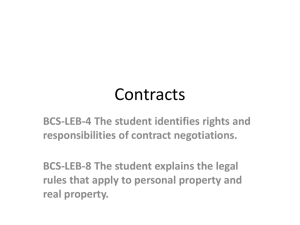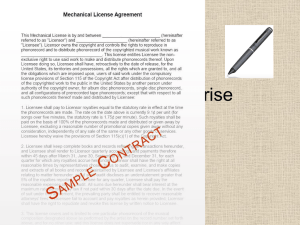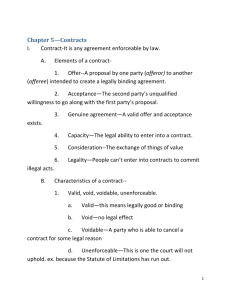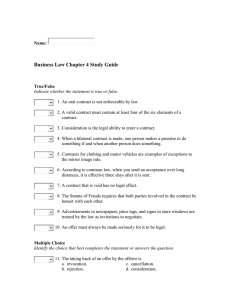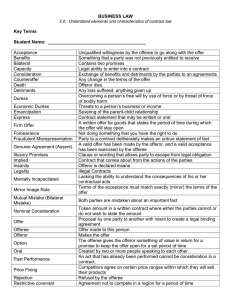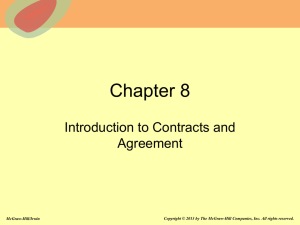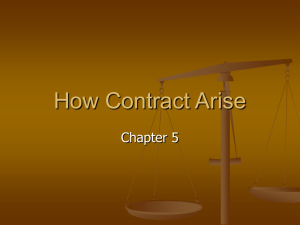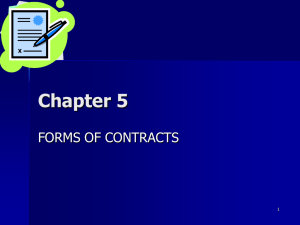Chapter 7 - Contract Law - Mr. Ulmer
advertisement
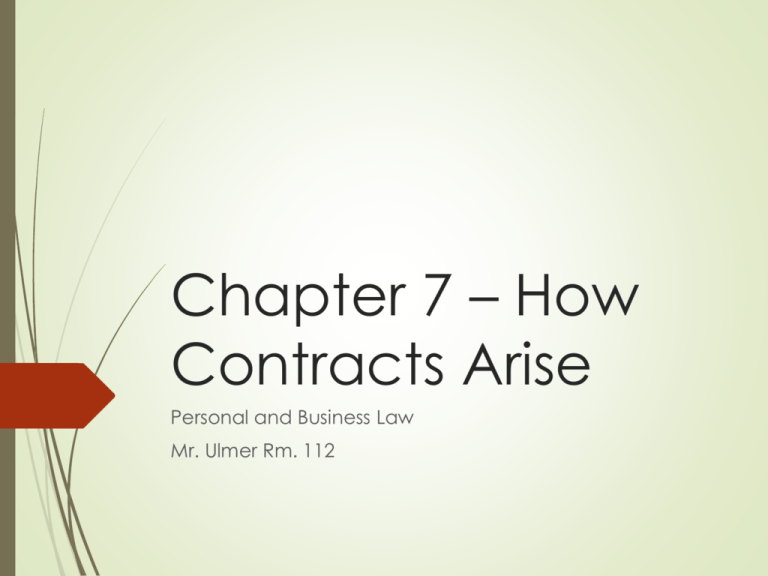
Chapter 7 – How Contracts Arise Personal and Business Law Mr. Ulmer Rm. 112 Definition Contract – is any agreement enforceable at law Elements of a Contract Offer Acceptance Genuine Agreement Consideration Capacity Legality -Figure 7-1 (p. 93) Offer A proposal made by one party (the offeror) to another party (the offeree) indicating a willingness to enter a contract Example: “I will give you $100 to wear this t-shirt all day at work.” Acceptance The agreement of the offeree to be bound by the terms of the offer Example: “I accept the offer. I will wear the t-shirt all day while I am at work.” Genuine Agreement Offer and acceptance go together to create genuine agreement, or a meeting of the minds Agreement can be destroyed by: Fraud Misrepresentation Mistake Duress Undue influence Consideration The thing of value promised to the other party in a contract in exchange for something else of value promised by the other party Mutual exchange binds the parties together Capacity The law presumes that anyone entering a contract has the legal capacity to do so People excused from contractual responsibility may include: Minors Mentally incompetent individuals Drugged or drunk individuals Legality Parties are not allowed to enforce contracts that involve doing something that is illegal Some illegal contracts involve agreement to commit a crime or tort Others involve activities made illegal by statutory law Importance of Elements To be legally complete, a contract must include these six elements. What if one of the elements is missing? A valid contract does not exist Characteristics of Contracts 4 Categories of Contracts 1) Valid, void, voidable, or unenforceable 2) Express or implied 3) Bilateral or unilateral 4) Oral or written Any one contract may have 1 or more of these 4 categories Valid, Void, and Voidable Valid – means legally good, which is legally binding Void – means no legal force, which has no legal effect whatsoever Voidable – When a party is able to void or cancel a contract for some legal reason, a contract is “voidable” Unenforceable Some rule of law that cannot enforce the contract in court. Statute of Limitations Example 1 (p. 94) Express, Implied An express contract is stated in words and may be either oral or written. An implied contract is one that comes about from the actions of the parties. Example 2 (p. 94) Bilateral, Unilateral Bilateral – is a contract that contains two promises – one from each person. Lloyd: “I will sell you my PS4 for $300” Harry: “I will buy it” Unilateral – One promise only. One person promises to do something in exchange for the other person’s promise to do something. Oral, Written Oral contract is created by word of mouth. Must be at least two people speaking for contract to come into existence Written contract is desirable since it allowed the parties to know the exact terms of the contract and provide proof agreement was made. Requirements of an Offer An Offer’s Three Basic Requirements: 1) It must be seriously intended 2) It must be definite and certain 3) Must be communicated to the offeree Requirements of an Acceptance The unqualified willingness to go along with the offer Basic Requirements for an Acceptance: 1) Unconditional Acceptance 2) Methods of Acceptance Termination of an Offer Revocation – the taking back of an offer by the offeror Rejection – rejection or refusal of an offer by the offeree Counteroffer – Any change in the terms of the offer by the offeree Termination of an Offer Expiration of Time If offeror puts a time limit for the acceptance of an offer, the offer may be terminated Death or Insanity If offeror dies or becomes insane before offer is accepted, the offer comes to an end

